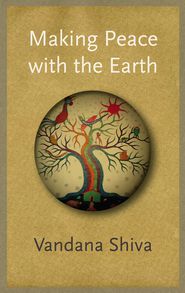Halifax Media Co-op
News from Nova Scotia's Grassroots
Book Review: Vandana Shiva's Making Peace With the Earth
- Making Peace With the Earth
- By Vandana Shiva
- Fernwood Publishing, co-published with: Pluto Press
- Paperback ISBN: 9781552665664
- Paperback Price: $24.95 CAD
- Publication Date: Apr 2013
- Pages: 288
Review by Jane Hudson
It is possible to interpret the fracking fiasco in New Brunswick as the result of a uniquely unlucky confluence of puppet leadership, corporate monopoly, and the executive nod to get ‘er done. Unfortunately, reading similar story after similar story from India in Vandana Shiva’s Making Peace with the Earth confirms that New Brunswick is not unique, and, as Shiva argues, corporations and governments coming together to force preposterous projects on unconsenting people is the new business-as-usual around the world. Take, for example, the story of POSCO’s plans to build a steel plant with accompanying coal and iron ore mines in Orissa, India.
POSCO is a Korean company which is owned mostly by foreign investors. The local administration has ignored the locals’ clear disapproval of the POSCO project, which would displace 22,000 people, cost many their livelihoods, and cause enormous environmental damage. Even profit, the only conceivable justification for the administration’s support of the project, is in question as the iron ore will be exploited by a foreign company at “throwaway” prices. Police have violently repressed local resistance and intimidated local people. The state, Shiva writes, has assumed the role of “facilitator, spokesperson, and promoter of POSCO.”
Shiva argues that Indian governments are becoming corporate lobbyists, and to support her case she brings dozens of well-documented examples on topics such as water privatization, global warming, mining, energy, forests and GMOs. Because Shiva draws her case studies from India, the numbers affected by projects she describes are astounding: the Tehri dam displaced 100,000 people, while mining has displaced 2.5 million people in the first 45 years of India’s independence, to cite just two examples.
The differences between India and less populous countries, however, are primarily of scale rather than kind. The stories Shiva tells follow a pattern that will be recognizable to anyone familiar with Canadian environmental politics. Shiva situates the Indian examples she recounts in the context of a global war on the earth for profit: “Not only is corporate power converging with state power for the great resource grab, corporate-state power is emerging as militarised power to undemocratically impose an unsustainable and unjust agenda on the earth and its people.”
Resisting this corporate-state agenda, Indians have held back the POSCO steel project in Orissa for eight years. In January 2014, POSCO announced that it will pull out of a separate steel project in Karnataka due in part to opponents blocking land acquisition. Shiva has been active in many of the resistance movements she describes in Making Peace with the Earth. She stood alongside the women and children who faced twenty police battalions clearing land for POSCO on June 23th, 2011 and wrote an open letter to Warren Buffett urging him to divest from the company (he has not). She might best be known for her leadership in the seed saving movement with her organization Navdanya, which features in the GMO chapter.
Vandana Shiva’s activism has been recognized with awards including the Right Livelihood Award (David Suzuki and Maude Barlow are also recipients). Making Peace with the Earth was built on Shiva’s 2010 Sydney Peace Prize lecture (available for viewing here: http://sydneypeacefoundation.org.au/sydney-peace-prize/lecture/).
The lecture covers the general arch of the book’s argument and benefits from the warmth and intelligence of Shiva’s voice. With its extensive examples and references, Making Peace with the Earth is a useful companion piece to the lecture, and a rich resource for anyone wishing to survey the state of environmental justice in India.
The site for the Halifax local of The Media Co-op has been archived and will no longer be updated. Please visit the main Media Co-op website to learn more about the organization.



